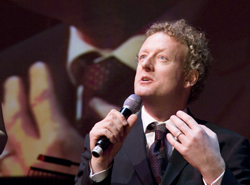Ending Singing Trauma
 As I mentioned in Friday’s post, I got to hear the UK’s ambassador of singing — Howard Goodall — speak last week. He talked about how the Sing Up program in Britain began.
As I mentioned in Friday’s post, I got to hear the UK’s ambassador of singing — Howard Goodall — speak last week. He talked about how the Sing Up program in Britain began.
As part of the preparation to create and implement the Sing Up program, Goodall and his team (why did I want to type “merry band of men?” *smile*) visited many schools throughout the UK. What they found was that in schools where someone passionate about singing worked, singing happened. In the schools, where no such person worked, it didn’t.
…
Goodall said, “The key issue of all was that general primary teachers, classroom teachers, felt very uncomfortable about leading singing and mostly did not want to.
The response that came back [when asked about singing] was seen through the prism of an adult’s version of singing, not a child’s version. The adults would say:
“I can’t sing.”
“I don’t sing in tune.”
“I’m embarassed.”
“I’m shy.”
“I don’t want to do this.”
“They were putting their fear, their worry about singing on to the children. Because if you’ve ever met a 6- or 7-year-old child … No 6- or 7-year-old is scared of singing. They all want to sing, it’s completely natural.
[The children’s] attitude was that they wanted to sing, but the adults were getting in the way of that.”
So … what happens?
When and how do we learn that it’s not okay to sing anymore?
…
Frequently when I talk to people about Songtaneous, they tell me that they can’t (or don’t) sing. (Even some of the professional singers I know shy away from spontaneous singing, i.e. vocal improvisation).
They tell me they feel silly singing or their voice doesn’t “sound right” (whatever “right” is). If we talk a little while longer, they almost always relate a story where someone (a friend, teacher, parent, sibling, spouse, partner) has told them — directly or indirectly — that they don’t sing well. And you can see that this story, though they laugh while telling it, is still painful. That the careless comment (by that friend, choir director, etc.) still stings.
I call this singing trauma.
…
Part of the problem is that we confuse singing with performing in our society. (Watch an episode of American Idol and you’ll see what I mean.)
Now, I’m a singer and a performer.
Performers do what they do, in part, for the entertainment of others. They should expect some judging of their performances. (We don’t have to like it, but we should expect it. *smile*). Critiques and feedback are part of my job.
Singers, on the other hand, are people who sing. (As Alice Walker wrote in one of her short stories: the fellow that sings is the singer.)
And just about anybody can do that. (Even people who can’t hear sing.)
…
Goodall spoke about how singing is woven throughout everyday life in Africa, reminding me of what both Ysaye Maria Barnwell and Bobby McFerrin had to say about the role of singing in other parts of the world. In Africa, Goodall notes, singing is a part of every activity.
In these communities, singing is pervasive and natural, not traumatic.
…
Part of my mission is to end singing trauma.
As far as I’m concerned the pros of singing, so extremely outweigh the cons that everyone should get to share in the goodies.
As Goodall said, the list of benefits from singing is pretty impressive.
Singing:
- aids the memory
- helps the brain grow and helps the rewiring of different parts of the brain
- is good for your health,
- makes you feel good,
- helps you concentrate,
- makes you feel good about yourself and helps self-esteem
- brings communities together [emphasis mine *smile*]
Given all the benefits, you’d be crazy not to sing.
Believe me when I tell you (yes, you!) that you have something to contribute with your voice just the way it is.
[…] Monday’s post about Ending Singing Trauma, today’s quote seems apropos … “Sing, Sing a song, Sing out loud, Sing out strong, […]
12 Mar 2010 at 12:48 am
[…] over the past two years I’ve learned that many of you are not spontaneous singers (yet! I’m on a mission after all *smile*) and you read and enjoy my blog […]
07 Jun 2010 at 9:39 am
[…] Ending Singing Trauma […]
06 Sep 2010 at 3:25 am
[…] With their nerves and their shyness about singing in front of others or their lack of experience or their singing trauma. They came in the room willing to sing and supported each other with such ease and joy. I have been […]
19 Oct 2014 at 9:58 pm